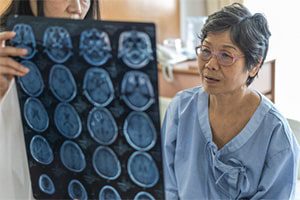
Understanding the Disorders of Consciousness Caused by Traumatic Brain Injuries A brain injury is defined as an injury to the brain that happened after birth that is not degenerative, hereditary, or congenital, and the injury causes changes in the neuronal activity of the brain. There are two types of brain injuries: Acquired Brain Injuries and […]

Traumatic brain injuries
A brain injury is defined as an injury to the brain that happened after birth that is not degenerative, hereditary, or congenital, and the injury causes changes in the neuronal activity of the brain. There are two types of brain injuries: Acquired Brain Injuries and Traumatic Brain Injuries.
One of the most famous brain injury cases involved a medical malpractice claim against an obstetrician-gynecologist in January of 1993. The Terri Schiavo brain injury lawsuit was eventually settled for one million dollars. Her husband, Michael Schiavo, was given $300,000 for loss of consortium, and another $700,000 was put into a trust to pay for the victim’s future care.
Ordinarily, brain injury lawsuits are filed in accordance with a legal theory termed negligence. A negligence claim entails the injured party or “plaintiff” filing a lawsuit to prove that the alleged “at-fault” party or “defendant” is legally liable or “at fault” for causing the injury.
Traumatic brain injuries are typically caused by a deliberate act, negligence, or involvement in an accident. Traumatic brain injury attorneys litigate these types of personal injury cases to recover financial compensation from the liable parties on behalf of brain injury victims.
Coma, vegetative state, brain death, locked-in state, and the minimally conscious state are distinct and medical conditions. Also, a brain-injured patient could move from one of these medical conditions to another. In some head trauma cases, a patient may arrive at the hospital in a coma, and then pass into a minimally conscious state, and then return to a normal state of consciousness and being. There are reported cases where patients have moved through the different states so quickly that the change is not noticeable. For example, a patient might immediately “awaken” from a coma.
Com
The most severe brain injuries start with a coma, which is can best be described as “eyes-closed unconsciousness.” Comas are not usually permanent medical conditions. Some coma patients move into a vegetative state, become brain dead, become “locked in,” or enter into a minimally conscious state. In many cases, coma patients recover completely. It is common for patients who have “awakened” from a coma to feel completely normal, or they may suffer a functional deficit such as cognitive impairment, weakness, or paralysis.
Brain Death
Another common sequela of a severe brain injury is brain death, which is the permanent loss of clinical function in the entire brain:
Brain death is a result of modern medical technology, made possible by cardiopulmonary resuscitation and ventilators. In America, we frequently apply the Harvard Medical School description of an irreversible coma as “brain death.” This medical definition was introduced back in 1968 and continues to the best description of the medical condition.
Once a physician deems the patient has lost all total brain function, the patient is diagnoses as “brain dead.” Also, when diagnosing a patient with brain death, the patient’s condition should be irreversible, and the cause should be established. For example, the patient fell from a height of 50 feet and landed on his or her head, causing irreversible brain damage. A brain dead diagnosis could also be confounded by many separate factors such as severe head trauma, hypothermia, and carbon dioxide retention.
All 50 states classify “brain death” as legal death. New York and New Jersey have created exceptions due to the cultural sensitivities and beliefs of the Orthodox Jewish community who use a cardiorespiratory standard of death.
Vegetative state
The vegetative state is another result of modern technology. The vegetative state is best described as an “eyes-opened unconsciousness.” While patients in a vegetative state appear awake, there is no evidence that the upper brain projects or receives information. The midbrain and the upper brain are not functioning with the brain stem or the rest of the patient’s body. However, the brain stem continues to manage vegetative functions such as breathing, heartbeats, and other involuntary actions.
Locked-in state
In the locked-in state, the patient’s consciousness is preserved and completely paralyzed except for blinking and eye movement.
Minimally conscious state
Currently, there isn’t a medical consensus within the neurology community regarding how to define the minimally conscious states. However, the generally accepted standard symptoms of a patient in a minimally conscious state are:
Patients suffering in the minimally conscious state have more brain function than patients living in a vegetative state. However, it is medically accepted that those who are in a minimally conscious state endure a lot more suffering than those in a vegetative state.
If you or a loved one sustained a brain injury, you could be qualified to file a lawsuit to recover monetary compensation for damages.
Parker Waichman LLP helps brain injury victims receive full monetary compensation. Trust your case with our brain injury attorneys. For a free consultation, contact our law firm today by using our live chat or calling 1-800-YOUR-LAWYER (1-800-968-7529).


